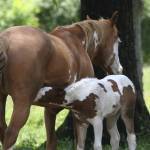Low Vitamin D Levels and Foals

When we think of newborn foal nutrition, colostrum is often the first thing that comes to mind Replete with infection-fighting antibodies and other healthy ingredients, colostrum jump-starts a foal’s immune system. In reality, the foal’s environment, management, and nutritional factors, including adequate vitamin D levels, all play an integral role in the balance between health and sickness.
“The role of vitamin D in human illness remains a controversial subject,” noted Peter Huntington, B.V.Sc., M.A.C.V.Sc., director of nutrition at Kentucky Equine Research (Australia).
For example, several studies show that low vitamin D levels are associated with greater hospitalization rates, increased severity of illness and mortality in patients with vitamin D deficiency compared to patients with normal vitamin D status. According to a recent review article*, a vitamin D deficiency can lead to disease by:
- Causing hypocalcemia, which is a well-known abnormality in critically ill patients in the course of sepsis and rhabdomyolysis;
- Altered regulation of both “arms” of the immune system (i.e., innate and adaptive immune systems); and,
- Its association with an increase in certain markers of systemic inflammation that are associated with multi-organ failure.
Low vitamin D levels have also been identified in sick foals. To better understand the role of vitamin D in sick neonates, Kamir** measured vitamin D, calcium, and parathyroid hormone (PTH, which regulates vitamin D) levels in both sick (septic and nonseptic) and healthy foals less than 72 hours old.
“Key findings of the study were that both septic and sick nonseptic foals had low vitamin D levels, less than 9.51 ng/mL of blood,” relayed Huntington.
Further, septic foals had significantly lower calcium and higher PTH concentrations than both healthy and sick but nonseptic foals.
These results prompted researchers to conclude that low vitamin D levels appear to play an important role in neonatal diseases, although a cause and effect relationship has yet to be established.
“More work is needed to determine if supplementation of the pregnant mare’s diet with vitamin D can improve the vitamin D status of the newborn foal and reduce neonatal disease risks,” explained Huntington. “It may be more important in those mares foaling early in spring when exposure to the sun and ultraviolet light is reduced over winter.”
According to Huntington, the pregnant mare needs to be supplied with the required recommended daily allowance of minerals and vitamins, and well-fortified feeds or balancer pellets may be necessary.
“Ensuring appropriate mare nutrition throughout gestation is integral to the long-term health and athletic potential of the foal,” Huntington concluded.
*de Haan, K., A.B.J. Groeneveld, and H.R.H. de Geus, et al. 2014. Vitamin D deficiency as a risk factor for infection, sepsis and mortality in the critically ill: Systematic review and meta-analysis. Critical Care. 18(6):660.
**Kamir, A. Vitamin D metabolites and their association with severity illness and mortality in hospitalized foals. In: Proc. American College of Veterinary Internal Medicine Forum. Indianapolis, Ind.








